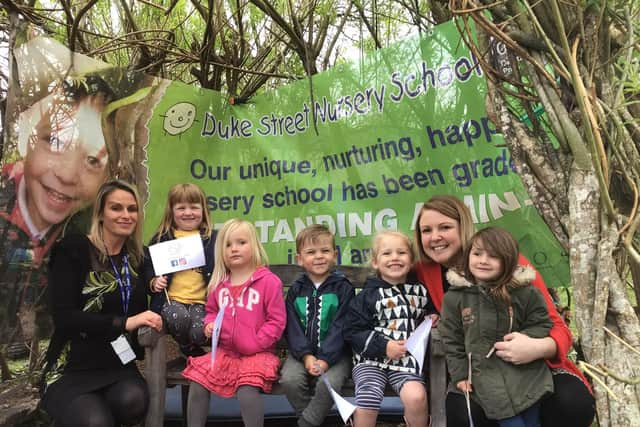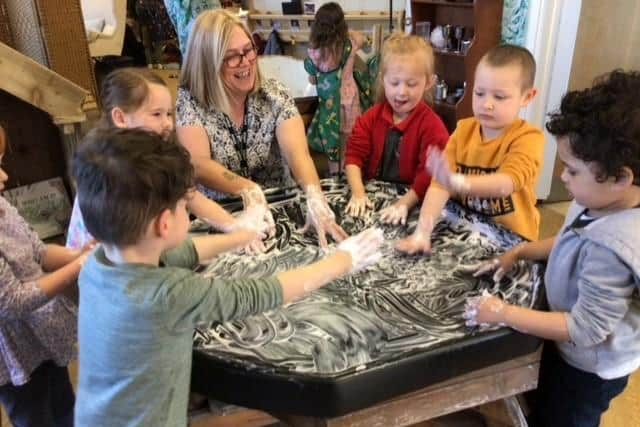Nursery head warns some children 'can't go to the toilet' or 'walk down a step' after lockdown and pleads with parents to enrol
and live on Freeview channel 276
Susan Conron, executive head teacher at the Chorley-based Duke Street and Highfield Nursery Schools, is concerned about the impact of the pandemic on language and other skills.
“Even though they are ready to learn, the children have not had the experiences that they would have had prior to the pandemic," she said.
Advertisement
Hide AdAdvertisement
Hide Ad“We are seeing some children arrive at nursery with much less speech than before."


Susan says that nursery children would normally spend their early years building 'social skills, confidence and self-esteem' but they have not been able to do this during lockdown.
“Children are now coming back into nursery with quite often low self-esteem and social confidence," she said.
“The pandemic has had such a big impact on these children that will take time to improve."
Advertisement
Hide AdAdvertisement
Hide AdResearch found that the past year of lockdowns has negatively impacted childrens' speech and language skills and the head and her team are seeing this first-hand.


Some children have 'lived half their lives in lockdown'.
The head says social skills have had to be 'unlearnt' and is concerned that some of the nursery children, who are two years old, have lived half of their lives in lockdown.
“If children have been mainly in the house that really limits their physical development," said Susan.
“We’re seeing children who are struggling physically which is unusual.
“Some children can’t even walk down a step."
Advertisement
Hide AdAdvertisement
Hide Ad“It's similar with toileting- we don’t know what it has been like at home.
"Some parents have been working so hard and trying to support their children the best they can.
"However, toileting has not appeared to be as successful at home."
When they attend one of Sue's nurseries, children and parents receive daily support and encouragement to develop physical skills.
Advertisement
Hide AdAdvertisement
Hide Ad“When they're at home, the parents are doing the toileting on their own under really difficult circumstances," said the head teacher.
“It’s really hard to even describe all the different negative impacts this has had on children and their development."
The nurseries that Sue helps to run, which she says are situated in areas of high deprivation, have been open throughout the pandemic.
“When lockdown started in March, we had a high number of children we felt needed to be in nursery, safely of course," she said.
Advertisement
Hide AdAdvertisement
Hide Ad“We have roughly 25-20% of complex needs children that we send to special schools every year so it was vital to get those children in, if it was safe to do so."
Support did not stop in the nursery and the teams at Duke Street and Highfield tried to support children at home wherever they could.
“If the child wasn’t actually in the building, we did lots of home learning and communication with parents," Sue said.
“It had to be tailor-made to every family."
Sue said that the nursery also supported parents and carers, often delivering up to ten food hampers a week.
Advertisement
Hide AdAdvertisement
Hide Ad“We supported families emotionally and with their mental health and some parents needed support from other services when it came to domestic abuse and mental health," she said.
“It was a really busy time for us because we were trying to run a nursery but also it was vitally important we reached out to those who weren’t in nursery."
Sue says her team ‘did their best’ throughout the pandemic but despite this she can see the impact it has had on the nursery children.
“We are working really, really hard to support the children and the families now that everybody is back in," she said.
Advertisement
Hide AdAdvertisement
Hide Ad"But it is going to take time, we can’t just put a plaster over these things."
Lockdown and social distancing has also taken its toll on children’s motor skills according to the head.
“It’s not just that their attainment plateaued, they regressed in many areas, she said.
“Some children who were toilet trained before the pandemic came back to us and were in nappies again.
Advertisement
Hide AdAdvertisement
Hide Ad“Plenty of children who would quite confidently play with peers prior to the pandemic are now really struggling."
Since restrictions have eased, Sue says some children have made progress.
“We have seen some fantastic progress but there is still quite a way to go with these children.
“It’s understandable: they’re not robots, they’re real little people who have lived through a pandemic and through trauma really."
Advertisement
Hide AdAdvertisement
Hide AdBut the headteacher is facing an uphill battle as some parents do not want to enrol their children due to safety fears.
“It’s vital that we make the world normal again for our children, “ she said.
“If children don't start accessing the world and nursery again, this will be a long-standing issue for more and more children.
“We want to send a message to parents that we have really high COVID safety measures in both our nursery schools and nurseries across the country.
Advertisement
Hide AdAdvertisement
Hide Ad“Research is showing that children are safe and are protected from infection, more so than adults.
“What children gain while they’re in a high-quality nursery school outweighs the risks."
The head believes that children 'need to be in nursery' after long periods of social isolation.
“If they carry on being at home, with limited experiences, then we will continue to see a huge negative impact on language and on physical, emotional, and social skills," she said.
"One of the main things we aim to create here is joy.
Advertisement
Hide AdAdvertisement
Hide Ad“There has not been a lot of joy in the world at the moment but when you walk through our doors you see children who are experiencing joy and laughter."
All children aged three to four-years-old are eligible for 570 hours of free childcare a year.
This equates to 15 hours a week during term time but can be flexible from week to week and some children are eligible for up to 30 hours of free childcare a week.
More information on free childcare and who is eligible can be found at the gov.uk website here.
More information about Duke Street and Highfield Nursery Schools can be found by clicking these links.
